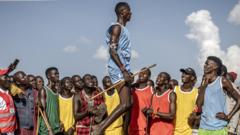This article explores the background of Shugalei, his ties to the Wagner Group, and the implications of his detention.
**Russia's Controversial Influence in Africa: The Case of Maxim Shugalei**

**Russia's Controversial Influence in Africa: The Case of Maxim Shugalei**
Maxim Shugalei’s recent arrest in Chad raises questions about Russia's methods and aims in Africa.
Maxim Shugalei, often portrayed as a heroic figure in bombastic propaganda films, has played a controversial role in expanding Russian influence in Africa, particularly through his work with the Wagner Group. Recently, Shugalei and two other Russian operatives were arrested in Chad under mysterious circumstances, sparking speculation about their activities and Russia’s geopolitical ambitions in the region. Following their arrest, they were released and sent back to Russia, as confirmed by the Russian embassy.
Shugalei, who self-identifies as a sociologist, operates more as a spin doctor and political operative. He has been under EU sanctions since 2023 due to his role in disinformation campaigns aimed at promoting the Wagner Group in various African nations, including plans for supporting political entities favorable to Russian interests. His connections to the late Yevgeny Prigozhin, the notorious head of the Wagner Group and an associate of President Vladimir Putin, further complicate his public persona.
The dramatic exploits of Shugalei are highlighted in a trilogy of action films likening him to a "James Bond" figure. These films, funded by Prigozhin, glorify the commendable image of Shugalei as a rugged, imperturbable operator while obscuring the more precarious realities of Russian operations on the ground. His earlier escapades in Libya, including arrests for election meddling, paved the way for his notoriety.
Despite his apparent shadowy influence, analysts remain divided on Shugalei's current relevance. His past achievements within the Foundation for the Protection of National Values suggest he occupied a significant position within Russian propaganda efforts, particularly with the objective of diminishing French influence in Africa. Nevertheless, the recent death of his mentor, Prigozhin, has changed the landscape for Shugalei, and his operations now seem less assured.
Various theories surrounding Shugalei's sudden arrest in Chad abound. While some speculate that the French government orchestrated the arrest, others believe it may be tied to Shugalei's potential influence on Chadian stability. The country retains strong ties with France, which could conflict with Russia’s aspirations in the region. Relationships with neighboring states such as Niger and the Central African Republic (CAR) have bolstered Russia’s growing footprint, and the Chadian leadership seems to be navigating a complex web of international interests.
Shugalei’s activities, under the guise of promoting Russian values in Africa, have included disinformation initiatives. Some social media initiatives, including TV channels propagating pro-Russian narratives, have emerged as tools of influence across the continent. However, the effectiveness of Shugalei's efforts remains contested, with many arguing that the targeted populations perceive such content more as entertainment rather than serious political messaging.
In conclusion, the fate of Maxim Shugalei serves as a reflection of the complexities inherent in Russia's influence operations across Africa. As international rivalries intensify, the implications of Shugalei's role in shaping public perception and political landscapes within the continent will continue to unravel, revealing the intricate balance of power at play.





















